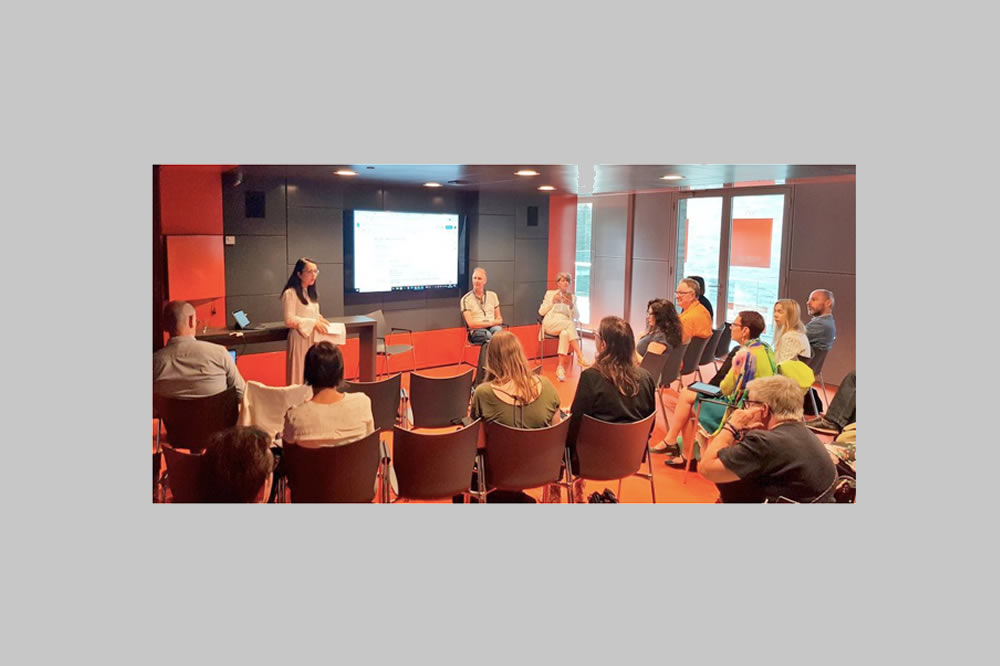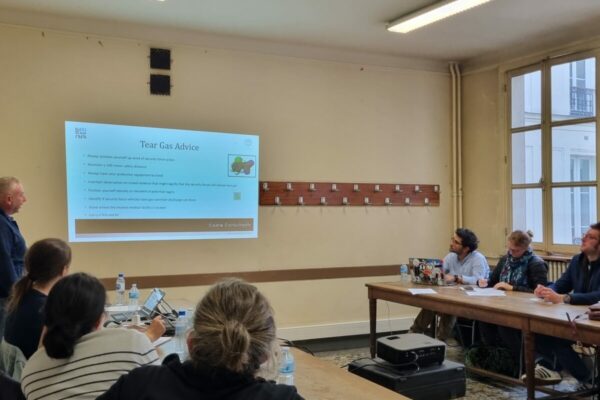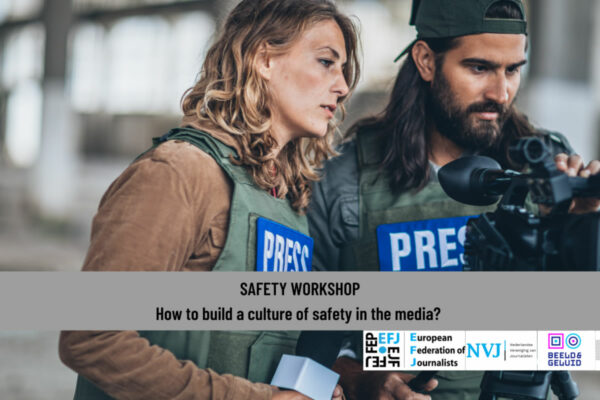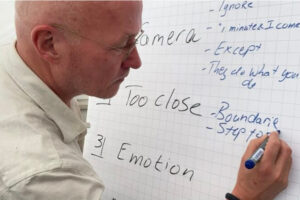Media employers have to do more to fulfil their duty of care for journalists’ safety, especially freelance and female journalists who are more vulnerable, concluded in a safety workshop held by the European Federation of Journalists (EFJ) and the Dutch Association of Journalists (NVJ) in the Hilversum Media Park on 4 and 5 July.
The workshop, attended by more than 40 EFJ members, legal experts, journalists and media representatives, highlighted the increasing dangers to journalists, both physical and online, with little awareness from media employers of these threats and a flagrant lack of resources to ensure their safety.
According to the results of a safety survey released in the workshop, a majority of journalists surveyed (75%) did not receive any safety training, not even first aid training, let alone training on hostile environments and cyber-security. Those who have received training were carried out more than six months ago and will require updated training. Often, journalists have to pay for their own safety training, especially freelance journalists.
Freelance journalists often feel alone and isolated. When they encounter dangers, they often have to deal with it alone. Hélène Servel, a freelance journalist who had worked for the French public broadcaster France 2 shared her frightening story of being attacked along with two colleagues by an agricultural baron in the south of France. “I felt alone and helpless. I did not receive any help from my employer, not even a word asking if I was OK after the attack,” said Hélène. She told the audience about the impact on her work: the new questions that arise before going into the field since then, the need to take a few months off work and to be supported in various aspects to move forward, in order not to give up on journalism.
The workshop calls for more actions and commitments from media employers to fulfil their duty of care for all journalists, especially freelance journalists. The NVJ shared their initiative jointly developed by the journalists’ association and the editors’ association, Perveilig. The initiative, supported by the government, has been successful in raising awareness of the safety of journalists and preventing attacks on journalists. It showed that the cooperation of journalists, media and the authorities are necessary to create a safe culture in the media and society. Journalists’ unions and associations from Belgium, Denmark, Germany, Serbia and the UK also shared their initiatives to protect the safety of journalists.
Oliver Liang, from the International Labour Institute (ILO), emphasised that health and safety issues are parts of the fundamental principles and rights at work enshrined in the ILO convention (No. 190), which the employers have a duty of care for their journalists. Liang believed that journalists should be considered as “risk workers” which is not yet a status in the ILO convention.
Speaking in the workshop, Willy Valckx, from the European Police Union, offered his support for journalists and encouraged cooperation to defend democracy as he recognised that there is a need to develop mutual trust and respect for the work of journalists and the police, especially during demonstrations.
The workshop also highlighted the important aspect of psychological well-being of journalists as a safety concerns, as journalists face an increasing workload in the 24-hour news cycle and digitisation. The digital space gave rise to online attacks and harassment on journalists, especially on female journalists. It also led to an emotional toll on journalists while media organisations lack resources and readiness to offer training and practical support for journalists.
Antonella Napoli, an investigative journalist from Italy who is currently under 24-hour police protection, shared her story and the impact of such protection on her personal life. “I love my job as a journalist, but I’m also a mother, a wife and a daughter. I am sad that I don’t feel safe walking on the street because of my job.” She expressed that she does not feel safer under police protection. Instead, it limits her freedom.
At the end of the workshop, participants proposed a series of recommendations and actions at both national and European levels to address the safety of journalists. They include:
Union actions & strategies
- Physical training on safety as part of a broader training programme offered by unions and associations; seek funding for such training programmes; integrate the safety aspects in other training programmes and tailor for the needs of specific target groups;
- Inform journalists members about their risks and encourage them to take up safety training
- Specific support and training for female and freelance journalists;
- Cooperation with employers’ organisations and raise awareness of their responsibility over the safety of journalists especially for freelance journalists;
- Psychological support for journalists;
- Safety issue in journalism schools – unions can hold information session and briefing to journalism students about risk;
- Cooperation with the police – find a specific contact for journalists unions; develop broader strategies – raise their awareness on the work of journalists, develop protocols, specific attention to handle cases involving journalists;
- Collective agreements and the role of the unions /associations.
Social dialogues, company polices in media organisations
- Editors and editors-in-chief should be the gate keepers to ensure the safety of journalists;
- Education of journalists on safety issues – e.g. academic level at universities /journalism schools (as a long-term measure); integrate safety issues in all discussion on journalism;
- Initiate a dialogue inside the newsrooms with fellow journalists and editors / media managers
- Training for editors on safety issues and raise their awareness;
- Develop internal safety policy within the media organisations; develop tailor-made internal policy especially for small, medium /independent media which lack resources. top managers / editors who have power to make a cultural shift should receive training.
- Collective bargaining and social dialogue to include safety provisions; as well as individual work contracts to include specific safety provisions for freelances.
State and institutional policy
- Strategies: find common ground and start by taking small steps to develop contact with institutions and political groups;
- Use international regulations (e.g. safety recommendations from the Council of Europe and the European Commission, International Labour Conventions) as leverage to start negotiation with governments and media employers;
- Safeguarding the independent mechanism within initiative funded / launched by the governments;
- Pushing the issue on the policy agenda by reaching out to politicians to raise it at the political level such as parliamentary debate on specific issues
- Use the motto “Journalism as a public good” to raise and engage public support and hold public debate and develop a public campaign.
Read more about the discussions on Twitter #safety4journalists.






